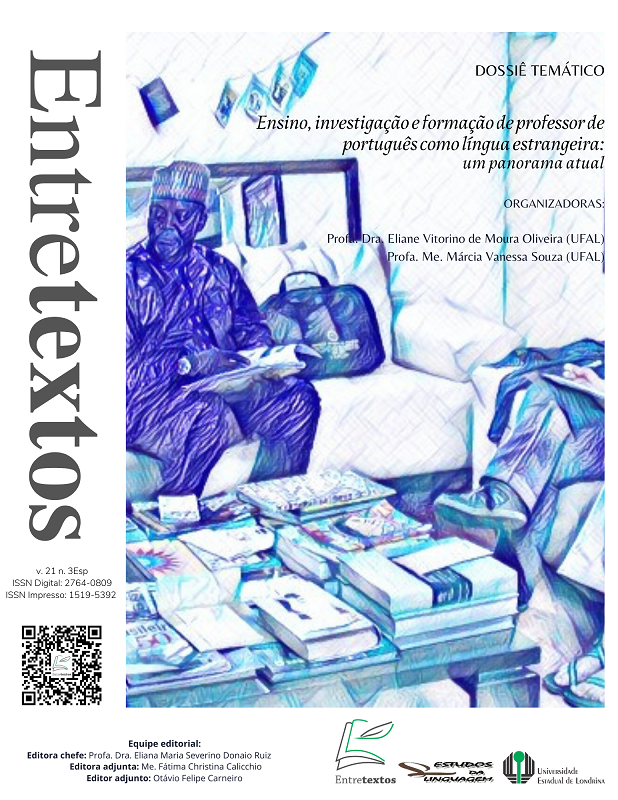The "Portuguese for Foreigners" Program: an overview of actions and contributions to the education of PAL teachers
DOI:
https://doi.org/10.5433/1519-5392.2021v21n3Esp.p151Keywords:
Portuguese as Additional Language. Teaching. Teacher education.Abstract
Inscribed in the scope of Applied Linguistics, this article aims to trace a history of the actions promoted by the "Portuguese for Foreigners" Program (PFP) developed at the Federal University of Pelotas in order to contribute to the debate on the construction of the teaching and learning area of Portuguese as a Foreign Language (PFL) from contexts and situated practices. We present an overview of the actions taken, the themes addressed and the assumptions that underlie the practices in the PFP, such as the New Literacy Studies, in order to discuss the Program's contributions to the training/education of teachers in the area of Portuguese as an Additional Language (PAL). Therefore, we carried out a survey of the editions and courses offered by the PFP. The results indicate that the Program subsidizes the training/education of teachers to work in the area of PAL, which is still so scarce in Letters Courses in Brazil, as students have the opportunity to participate in various training/educational actions. With the offer and construction of the courses, PFP seeks not only to qualify students who have the possibility of future work in the area, but also to encourage reflection on the teaching activity in PAL and on the specificities that are part of it.
Downloads
References
LEA, Mary R.; STREET, Brian V. Student writing in higher education: an academic literacies approach. Studies in Higher Education, Dorchester on Thames, v. 23, n. 2, p. 157-172, 1998.
LILLIS, Teresa; SCOTT, Mary. Defining academic literacies research: issues of epistemology, ideo- logy and strategy. Journal of Applied Linguistics, [s. l.], v. 4, n. 1, p. 5-32, 2007.
PAIVA, Vera Lúcia Menezes de Oliveira e. Teoria Sociocultural. In: PAIVA, Vera Lúcia Menezes de Oliveira e. Aquisição de segunda língua. São Paulo: Parábola Editorial, 2014. p. 127-140.
RIO GRANDE DO SUL. Secretaria de Estado da Educação. Departamento Pedagógico. Referenciais curriculares do Estado do Rio Grande do Sul: lições do Rio Grande: Linguagens, Códigos e suas Tecnologias; Língua Portuguesa e Literatura; Língua Estrangeira Moderna. Porto Alegre: SE/DP, 2009, v. 1. Disponível em: https://servicos.educacao.rs.gov.br/dados/refer_curric_vol1.pdf. Acesso em: 20 set. 2021.
SCHLATTER, Margarete; BULLA, Gabriela da Silva; COSTA, Everton Vargas da. Português como Língua Adicional: uma entrevista com Margarete Schlatter. ReVEL, [s. l.], v. 18, n. 35, p. 489-508, 2020.
UFPel - UNIVERSIDADE FEDERAL DE PELOTAS. Conselho Coordenador do Ensino, da Pesquisa e da Extensão. Resolução n. 06/2018, de 21 de abril de 2018. aprova o plano de planejamento estratégico de internacionalização da Universidade Federal de Pelotas. Pelotas: Conselho Coordenador do Ensino, da Pesquisa e da Extensão, 2018. Disponível em: https://wp.ufpel.edu.br/scs/files/2018/06/SEI_Resolu%C3%A7%C3%A3o-062018.pdf. Acesso em: 5 out. 2021.
UFPel - UNIVERSIDADE FEDERAL DE PELOTAS. Conselho Coordenador do Ensino, da Pesquisa e da Extensão. Resolução nº 01/2020, de 20 de fevereiro de 2020. Institui a política linguística da Universidade Federal de Pelotas (UFPel). Pelotas: Conselho Coordenador do Ensino, da Pesquisa e da Extensão, 2020. Disponível em: https://ccs2.ufpel.edu.br/wp/wp-content/uploads/2020/03/Res.-01.2020-Politica-Linguistica-Institucional-da-UFPel.pdf. Acesso em: 5 out. 2021.
WENGER, Etienne; MCDERMOTT, Richard A.; SNYDER, William Snyder . Cultivating communities of practice: a guide to managing knowledge. Boston: Harvard Business School Press, 2002.
Downloads
Published
How to Cite
Issue
Section
License
Copyright (c) 2021 Entretextos

This work is licensed under a Creative Commons Attribution 4.0 International License.
Entretextos adota a Licença Creative Commons Attribution 4.0 International, portanto, os direitos autorais relativos aos artigos publicados são do/s autor/es.
Sob essa licença é possível: Compartilhar - copiar e redistribuir o material em qualquer suporte ou formato. Adaptar - remixar, transformar, e criar a partir do material, atribuindo o devido crédito e prover um link para a licença e indicar se mudanças foram feitas.























